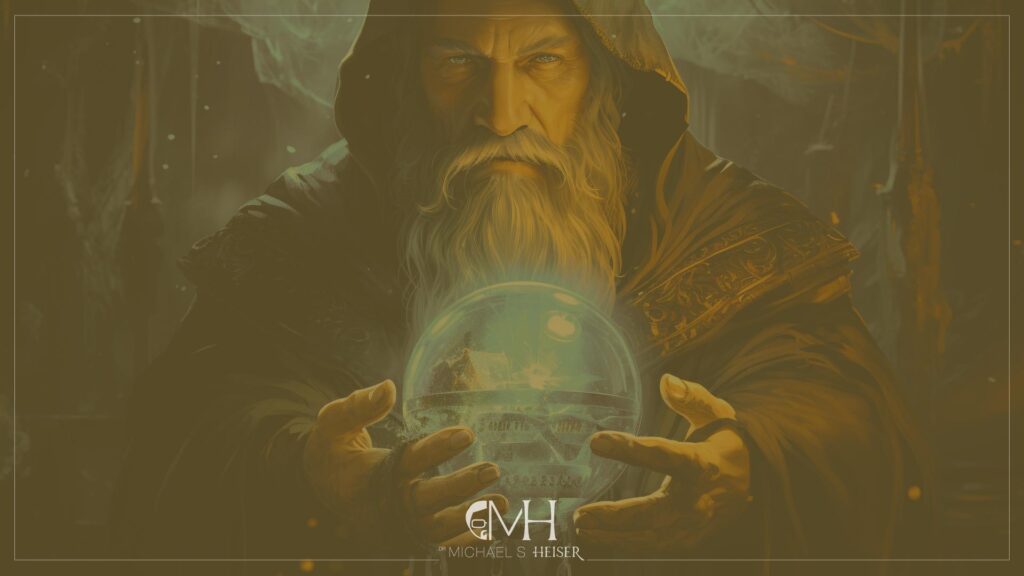Link original: https://drmsh.com/recommended-reading

Esta página es una lista minimalista de libros que el Dr. Heiser recomienda sobre diversos temas. Dado que el Dr. Heiser trata activamente de inyectar pensamiento sensato en temas marginales y pseudohistoria a través de su podcast Peeranormal [por ahora sólo disponible en inglés] y su canal de YouTube, esta lista incluye temas “Fringe”. Su inclusión no significa que apruebe el contenido de ningún artículo, salvo su propio trabajo.
Con respecto a su propia investigación, la bibliografía de los temas tratados en el libro del Dr. Heiser, El Mundo Invisible, es voluminosa. La bibliografía personal del Dr. Heiser para esa investigación cuenta actualmente con 6.200 entradas. Aparte de los artículos bibliográficos de El Mundo Invisible, se remite a los lectores a la sección en este sitio web en donde se publicarán los artículos y referencias. Con respecto al consejo divino, se anima a los lectores a la sección en este sitio web dedicada a ese tema [todavía en construcción].
Índice:
Estudios Bíblicos y de la Antigüedad:
- Libros y artículos del Dr. Heiser
- Obras de referencia
- Génesis 6, 1 Enoc, Recepción de 1 Enoc en la Iglesia primitiva
- Gramáticas de lenguas antiguas
- Recursos para el estudio de palabras (hebreo, griego)
- Textos del Próximo Oriente en traducción
- Jesús histórico, respuestas al miticismo de Jesús
- Crítica textual del Nuevo Testamento, respuestas a Bart Ehrman
- Crítica textual del Antiguo Testamento y Septuaginta (LXX)
- Trasfondo del Antiguo Testamento en el Próximo Oriente
- Judaísmo del Segundo Templo y trasfondo del Nuevo Testamento
- Los rollos del Mar Muerto y Qumrán
- Apócrifos y pseudoepígrafos
Estudios Fringe:
- OVNIs: Religión y sistemas de creencias
- SETI y el debate sobre la vida Extraterreste
- Paleobalbuceo y arqueología Fringe
Estudios bíblicos y de la Antigüedad:
Libros y artículos del Dr. Heiser
Libros en español
Michael S. Heiser, El Mundo invisible: Recuperando la cosmovisión sobrenatural de la Biblia. Editorial Tesoro Bíblico, 2019
Michael S. Heiser, Sobrenatural (Miqlat, 2017)
Michael S. Heiser, Ángeles: Lo que la Biblia realmente dice acerca de la hueste celestial de Dios (Editorial Tesoro Bíblico, 2020)
Michael S. Heiser, Demonios: Lo que la Biblia realmente dice sobre los poderes de las tinieblas (Editorial Tesoro Bíblico, 2021)
Libros en inglés [se espera que se traduzcan eventualmente]
Michael S. Heiser, A Companion to the Book of Enoch: A Reader’s Commentary, Vol I: The Book of the Watchers (1 Enoch 1-36) (Defender, 2019)
Michael S. Heiser, A Companion to the Book of Enoch:A Reader’s Commentary, Vol II: The Parables of Enoch (1 Enoch 37-71) (Defender, 2021)
Michael S. Heiser, The World Turned Upside Down: Finding the Gospel in Stranger Things (Lexham, 2019)
Michael S. Heiser, Brief Insights on Mastering Bible Study: 80 Expert Insights, Explained in a Single Minute (60-Second Scholar Series) (Zondervan, 2018)
Michael S. Heiser, Brief Insights on Mastering the Bible: 80 Expert Insights on the Bible, Explained in a Single Minute (60-Second Scholar Series) (Zondervan, 2018)
Michael S. Heiser, Brief Insights on Mastering Bible Doctrine: 80 Expert Insights, Explained in a Single Minute (60-Second Scholar Series) (Zondervan, 2018)
Artículos [Eventualmente se traducirán al español]
Michael S. Heiser, “Does Divine Plurality in the Hebrew Bible Demonstrate an Evolution from Polytheism to Monotheism in Israelite Religion?” Journal for the Evangelical Study of the Old Testament 1:1 (2012): 1-24
Michael S. Heiser, “¿Monoteísmo, politeísmo, monolatría o henoteísmo? Hacia una evaluación de la pluralidad divina en la Biblia hebrea” Bulletin of Biblical Research 18:1 (2008): 1-30
Michael S. Heiser, “¿Has visto a un Elohim, los has visto a todos? Una crítica al uso que el mormonismo hace del Salmo 82” Foundation for Ancient Research and Mormon Studies Review 19:1 (2007): 221-266
- Este es un artículo del Dr. Heiser, publicado en una revista mormona, en el que critica la forma en que el mormonismo entiende el Salmo 82 y el concilio divino.
Michael S. Heiser, “Are Yahweh and El Distinct Deities in Deut. 32:8-9 and Psalm 82?” HIPHIL 3 (2006); online journal
Michael S. Heiser, “The Divine Council in Late Canonical and Non-Canonical Second Temple Jewish Literature,” PhD diss., University of Wisconsin-Madison, 2004
Michael S. Heiser, “Deuteronomy 32:8 and the Sons of God,” Bibliotheca Sacra 158 (Jan-March, 2001): 52-74
Michael S. Heiser, “Monotheism and the Language of Divine Plurality in the Hebrew Bible and the Dead Sea Scrolls,” Tyndale Bulletin 65:1 (2014): 85-100
Obras de referencia
Diccionarios bíblicos en un volumen [En inglés. Pronto se añadirán las versiones en español a medida que estas se publiquen por sus respectivas editoriales]
(Nelson): Nelson’s New Illustrated Bible Dictionary: An Authoritative One-Volume Reference Work on the Bible, With Full-Color Illustrations
(Moody): The New Unger’s Bible Dictionary
(InterVarsity): New Bible Dictionary
(Lexham Press): Lexham Bible Dictionary (this is a digital resource that is available for free)
(Baker): Evangelical Dictionary of Theology (Baker Reference Library)
Otros diccionarios especializados de un solo volumen:
Gran diccionario enciclopédico de imágenes y símbolos de la Biblia
Dictionary of Deities and Demons in the Bible, Second Edition (Nota: Este recurso es obra de eruditos críticos, no de evangélicos. En consecuencia, si no estás familiarizado con los métodos y el pensamiento críticos, puede que no estés preparado para él. Dicho esto, es la mejor obra de este tipo y gran parte de su contenido sólo puede encontrarse en monografías y revistas académicas de alto nivel).
Dictionary of Scripture and Ethics
Los mejores diccionarios de varios volúmenes
The InterVarsity Press Dictionary Set (8 volúmenes: cuatro del Antiguo Testamento y cuatro del Nuevo Testamento). En la actualidad, se trata de la mejor y más actualizada colección. Está disponible como un conjunto o por volúmenes individuales. Todos estos volúmenes están disponibles en formato digital a través de Logos Bible Software, así como en copia impresa.
Volúmenes del Antiguo Testamento:
Dictionary of the Old Testament: Pentateuch (The IVP Bible Dictionary Series)
Dictionary of the Old Testament: Historical Books (The IVP Bible Dictionary Series)
Dictionary of the Old Testament: Wisdom, Poetry & Writings (The IVP Bible Dictionary Series)
Dictionary of the Old Testament: Prophets (The IVP Bible Dictionary Series)
Volúmenes del Nuevo Testamento:
Dictionary of New Testament Background: A Compendium of Contemporary Biblical Scholarship (The IVP Bible Dictionary Series)
Dictionary of Jesus and the Gospels (IVP Bible Dictionary)
Dictionary of Paul and His Letters (The IVP Bible Dictionary Series)
Dictionary of the Later New Testament & Its Developments (The IVP Bible Dictionary Series)
Génesis 6, 1 Enoc, Recepción de 1 Enoc en la Iglesia primitive
Amar Annus, “On the Origin of the Watchers: A Comparative Study of the Antediluvian Wisdom in Mesopotamian and Jewish Traditions,” Journal for the Study of the Pseudepigrapha 19.4 (2010): 277–320
- Se trata del artículo más importante hasta la fecha sobre Gn 6:1-4. Supera todos los trabajos realizados sobre el trasfondo mesopotámico, trabajos que francamente palidecen en comparación con los datos que Annus aporta sobre el pasaje. Annus muestra con gran claridad cómo las tradiciones apkallu mesopotámicas son el trasfondo de Gn 6:1-4 (y, por tanto, el trasfondo sobrenatural sobre el que se escribió y debe entenderse), junto con la forma en que los escritores judíos del Segundo Templo comprendieron el trasfondo mesopotámico. La tradición cristiana posterior (es decir, los padres de la iglesia) no sabía nada de este trasfondo, por lo que las primeras interpretaciones de la iglesia que produjeron la visión setita violaron el contexto original del texto. En resumen, cualquier interpretación no sobrenaturalista de Gn 6:1-4 es incoherente con el contexto mesopotámico original en el que se centra la polémica del pasaje.
James C. VanderKam, “1 Enoch, Enochic Motifs, and Enoch in Early Christian Literature,” in The Jewish Apocalyptic Heritage in Early Christianity; ed. James C. VanderKam and William Adler; Minneapolis: Fortress, 1996), 33–101
Archie T. Wright, The Origin of Evil Spirits: The Reception of Genesis 6:1-4 in Early Jewish Literature, Revised Edition (Wissenschaftliche Untersuchungen zum Neuen Testament 198, second series; Tübingen: Mohr Siebeck, 2013)
Annette Yoshiko Reed, Fallen Angels and the History of Judaism and Christianity: The Reception of Enochic Literature (Cambridge: Cambridge University Press, 2005)
James C. Vanderkam and George W. E. Nickelsburg, 1 Enoch: The Hermeneia Translation (Fortress Press, 2012)
- Ésta es la traducción más reciente, textualmente actualizada y erudita de 1 Enoc. Está tomada de la serie de comentarios eruditos que figura a continuación.
George W. E. Nickelsburg, 1 Enoch, v.1: A Commentary on the Book of 1 Enoch, Chapters 1-36, 81-108 (Hermeneia: A Critical & Historical Commentary on the Bible)
George W. E. Nickelsburg, 1 Enoch v. 2: A Commentary on the Book of 1 Enoch, Chapters 37-82 (Hermeneia: a Critical and Historical Commentary on the Bible)
Harkins and Coblentz-Bautch, The Watchers in Jewish and Christian Traditions
Gramáticas de lenguas antiguas
Mark Futato, Beginning Biblical Hebrew (Eisenbrauns); MEMRA textbook
Robert Holmstedt and John Cook, Beginning Biblical Hebrew: A Grammar and Illustrated Reader (Baker)
Karl Kutz and Rebecca Josberger, Learning Biblical Hebrew: Reading for Comprehension: An Introductory Grammar (Lexham, 2018)
Miles Van Pelt, Basics of Biblical Aramaic: Complete Grammar, Lexicon, and Annotated Text (Zondervan); MEMRA textbook
Alger Johns, A Short Grammar of Biblical Aramaic (Andrews University Monographs) (Andrews University)
James Jumper, A Short Grammar of Biblical Aramaic: An Annotated Answer Key to Alger Johns’s (Andrews University)
Bekins, Inscriptions from the World of the Bible (Hendrickson, 2020)
- Se trata de una gramática y un manual de autoaprendizaje de textos epigráficos hebreos y semíticos del noroeste (fenicio, arameo, etc.).
Randall Garr, Dialect Geography of Syria-Palestine, 1000-586 BCE
- Este libro abarca de forma abreviada el fenicio, el moabita, el amonita, el hebreo epigráfico y el arameo antiguo. Para utilizarlo se requiere un buen conocimiento del hebreo antiguo.
Michael Williams, Basics of Ancient Ugaritic: A Concise Grammar, Workbook, and Lexicon (Zondervan); MEMRA textbook
John Huehnergard, An Introduction to Ugaritic (Hendrickson)
Pierre Bordreuil and Dennis Pardee, A Manual of Ugaritic (Eisenbrauns)
James Allen, Middle Egyptian: An Introduction to the Language and Culture of Hieroglyphs (Cambridge); MEMRA textbook
James Hoch, Middle Egyptian Grammar (SSEA Publications) (Toronto)
Mark Collier, How to Read Egyptian Hieroglyphs: A Step-by-Step Guide to Teach Yourself (Univ California Press)
John Huehnergard, A Grammar of Akkadian, 3rd ed. (Harvard Semitic) (Eisenbrauns)
John Huehnergard, Key to a Grammar of Akkadian (Harvard Semitic studies) (Eisenbrauns)
Martin Worthington, Complete Babylonian (Teach Yourself) (McGraw-Hill)
Miller and Shipp, An Akkadian Handbook: Helps, Paradigms, Glossary, Logograms, and Sign List
Daniel Foxvog, Introduction to Sumerian Grammar (Create Space; this book = notes from class taught at UC-Berkeley)
John L. Hayes, A Manual of Sumerian Grammar and Texts (UNDENA)
Dietz Otto Edzard, Sumerian Grammar (Handbook of Oriental Studies) (Brill)
William Mounce, Basics of Biblical Greek Grammar (Zondervan)
David Alan Black, Learn to Read New Testament Greek, 3rd ed. (Broadman & Holman); MEMRA textbook
Sandra Gogel, A Grammar of Epigraphic Hebrew (Sbl – Resources for Biblical Study)
Recursos para el estudio de las palabras (hebreo, griego)
Van Gemeren, New International Dictionary of Old Testament Theology and Exegesis (5 volume set)
Silva, New International Dictionary of New Testament Theology and Exegesis Set
Textos del Cercano Oriente traducidos al inglés
NOTA: Sólo el conjunto Context of Scripture que figura a continuación abarca todas las principales culturas alfabetizadas del Próximo Oriente antiguo. El resto se limita al enfoque de sus títulos.
Benjamin Foster, Before The Muses: An Anthology Of Akkadian Literature
Benjamin Foster, From Distant Days: Myths, Tales, and Poetry of Ancient Mesopotamia
- un libro de bolsillo abreviado en un volumen del conjunto de dos volúmenes, Before the Muses. Naturalmente, éste tiene menos cobertura.
Hallo and Younger, The Context of Scripture: Canonical Compositions, Monumental Inscriptions and Archival Documents from the Biblical World, 3 Vol Set
James B. Pritchard, The Ancient Near East, Volume 1: An Anthology of Texts and Pictures
James B. Pritchard, The Ancient Near East (Volume II): A New Anthology of Texts and Pictures
Nicolas Wyatt, Religious Texts from Ugarit: 2nd Edition (Biblical Seminar)
Michael Coogan, Stories from Ancient Canaan, Second Edition
Simon B. Parker, Ugaritic Narrative Poetry
John L. Foster, Ancient Egyptian Literature: An Anthology
William Kelley Simpson, The Literature of Ancient Egypt: An Anthology of Stories, Instructions, Stelae, Autobiographies, and Poetry; Third Edition
James Allen, The Ancient Egyptian Pyramid Texts (Writings from the Ancient World)
Leprohon and Strudwick, Texts from the Pyramid Age (Writings from the Ancient World)
Vanstiphout, Epics of Sumerian Kings: The Matter of Aratta (Writings from the Ancient World)
H. Lindenberger, Ancient Aramaic and Hebrew Letters (Writings from the Ancient World, No. 14)
Jesús histórico, respuesta al miticismo sobre Jesús
Porter, Unmasking the Pagan Christ: An Evangelical Response to the Cosmic Christ Idea
M. Bird, How God Became Jesus: The Real Origins of Belief in Jesus’ Divine Nature—A Response to Bart D. Ehrman
C. Evans, Fabricating Jesus: How Modern Scholars Distort the Gospels
Boyd and Eddy, The Jesus Legend: A Case for the Historical Reliability of the Synoptic Jesus Tradition
M. Casey, Jesus: Evidence and Argument or Mythicist Myths? (Biblical Studies)
Crítica textual del Nuevo Testamento, respuesta a Bart Ehrman
David Alan Black, New Testament Textual Criticism: A Concise Guide
Bruce Metzger, The Text of the New Testament: Its Transmission, Corruption, and Restoration (4th Edition)
Kurt Aland, The Text of the New Testament: An Introduction to the Critical Editions and to the Theory and Practice of Modern Textual Criticism
J. H. Greenlee, Introduction to New Testament Textual Criticism
Dan Wallace, Revisiting the Corruption of the New Testament: Manuscript, Patristic, and Apocryphal Evidence (Text and Canon of the New Testament)
Philip Comfort, Encountering the Manuscripts: An Introduction to New Testament Paleography & Textual Criticism
Philip Comfort, The Text of the Earliest New Testament Greek Manuscripts
Timothy Paul Jones, Misquoting Truth: A Guide to the Fallacies of Bart Ehrman’s “Misquoting Jesus”
Crítica textual del Antiguo Testamento y la Septuaginta (LXX)
Ellis Brotzman, Old Testament Textual Criticism: A Practical Introduction
E. Tov, Textual Criticism of the Hebrew Bible
E. Wurthwein, The Text of the Old Testament: An Introduction to the Biblia Hebraica
Brenton, The Septuagint with Apocrypha: Greek and English
Pietersma, A New English Translation of the Septuagint
- La mejor traducción actual al inglés de la LXX
Jobes and Silva, Invitation to the Septuagint
- La mejor introducción para iniciarse en el estudio de la LXX
Timothy Michael Law, When God Spoke Greek: The Septuagint and the Making of the Christian Bible
Jennifer Dines, The Septuagint (Understanding the Bible and Its World)
Natalio Fernandez Marcos, The Septuagint in Context: Introduction to the Greek Version of the Bible
Trasfondo del Antiguo Testamento en el Cercano Oriente
John Walton, Ancient Near Eastern Thought and the Old Testament: Introducing the Conceptual World of the Hebrew Bible
John Walton, El Mundo Perdido de Genesis Uno: Cosmología antigua y el debate de los orígenes (Spanish Edition)
John Walton, Ancient Israelite Literature in its Cultural Context
John Walton, The Lost World of Scripture: Ancient Literary Culture and Biblical Authority
John Walton, Genesis 1 as Ancient Cosmology
L. Stadelmann, The Hebrew Conception of the World: A Philological and Literary Study (Analecta Biblica, No 39)
Patrick Miller, The Religion of Ancient Israel (Library of Ancient Israel)
John Walton (ed), Zondervan Illustrated Bible Backgrounds Commentary Set: Old Testament
Becking (ed), Dictionary of Deities and Demons in the Bible, Second Edition (Revised 2nd) [Hardcover]
R. Parry, The Biblical Cosmos: A Pilgrim’s Guide to the Weird and Wonderful World of the Bible
Kenton Sparks, Ancient Texts for the Study of the Hebrew Bible: A Guide to the Background Literature
Jack Sasson (ed), Civilizations of the Ancient Near East (4 Volumes Set)
Roland de Vaux, Ancient Israel: Its Life and Institutions (Biblical Resource)
Judaísmo del Segundo Templo y trasfondo del Nuevo Testamento
Craig Evans, Ancient Texts for New Testament Studies: A Guide to the Background Literature
E. Schurer, A History of the Jewish People in the Time of Jesus Christ (5 volume set)
O. Skarsaune, In the Shadow of the Temple: Jewish Influences on Early Christianity
O. Skarsaune, Jewish Believers in Jesus: The Early Centuries
J. Scott, Jewish Backgrounds of the New Testament
J. Fitzmyer, The Semitic Background of the New Testament (Biblical Resource Series)
Becking (ed), Dictionary of Deities and Demons in the Bible, Second Edition (Revised 2nd) [Hardcover]
Helyer, Exploring Jewish Literature of the Second Temple Period: A Guide for New Testament Students (Christian Classics Bible Studies)
Evans (ed), Dictionary of New Testament Background (The IVP Bible Dictionary Series)
Louis Feldman, James Kugel, Lawrence Schiffman (eds,), Outside the Bible, 3-volume set: Ancient Jewish Writings Related to Scripture (MUY CARO)
Michael Stone (ed.), Jewish Writings of the Second Temple Period (Compendia Rerum Iudaicarum Ad Novum Testamentum)
Los Rollos del Mar Muerto y Qumrán
Charlesworth (ed), Jesus and the Dead Sea Scrolls (The Anchor Bible Reference Library)
Vanderkam (ed), The Meaning of the Dead Sea Scrolls: Their Significance For Understanding the Bible, Judaism, Jesus, and Christianity
Abegg (ed), The Dead Sea Scrolls Bible: The Oldest Known Bible Translated for the First Time into English
Garcia-Martinez (ed), The Dead Sea Scrolls Translated: The Qumran Texts in English
Vanderkam, The Dead Sea Scrolls Today, rev. ed
Magness (ed), The Archaeology of Qumran and the Dead Sea Scrolls (Studies in the Dead Sea Scrolls and Related Literature)
Apócrifos y pseudoepígrafos
James C. VanderKam, “1 Enoch, Enochic Motifs, and Enoch in Early Christian Literature,” in The Jewish Apocalyptic Heritage in Early Christianity; ed. James C. VanderKam and William Adler; Minneapolis: Fortress, 1996), 33–101
James C. Vanderkam and George W. E. Nickelsburg, 1 Enoch: The Hermeneia Translation (Fortress Press, 2012)
- Ésta es la traducción más reciente, textualmente actualizada y erudita de 1 Enoc. Está tomada de la serie de comentarios eruditos que figura a continuación.
George W. E. Nickelsburg, 1 Enoch, v.1: A Commentary on the Book of 1 Enoch, Chapters 1-36, 81-108 (Hermeneia: A Critical & Historical Commentary on the Bible)
George W. E. Nickelsburg, 1 Enoch v. 2: A Commentary on the Book of 1 Enoch, Chapters 37-82 (Hermeneia: a Critical and Historical Commentary on the Bible)
Charlesworth (ed), The Old Testament Pseudepigrapha ( 2 Volume set)
Charles (ed), The Apocrypha and Pseudepigrapha of the Old Testament: Apocrypha
Charles (ed), The Apocrypha and Pseudepigrapha of the Old Testament, Volume Two
D. de Silva, Introducing the Apocrypha: Message, Context, and Significance
Nickelsburg, Jewish Literature Between the Bible and the Mishnah: A Historical and Literary Introduction
Estudios Fringe:
OVNIs: Religión y sistemas de creencias
Vallee, Passport to Magonia: On UFOs, Folklore, and Parallel Worlds
Vallee, Messengers of Deception: UFO Contacts and Cults
Colavito, Faking History: Essays on Aliens, Atlantis, Monsters, and More
Colavito, The Cult of Alien Gods: H.P. Lovecraft And Extraterrestrial Pop Culture
Pauwels and Bergier, The Morning of the Magicians: Secret Societies, Conspiracies, and Vanished Civilizations
Gulyas, Extraterrestrials and the American Zeitgeist: Alien Contact Tales Since the 1950s
Peters, UFOs: God’s Chariots: Spirituality, Ancient Aliens, and Religious Yearnings in the Age of Extraterrestrials
Keel, Operation Trojan Horse: The Classic Breakthrough Study of UFOs
Alnor, Ufo’s in the New Age: Extraterrestrial Messages and the Truth of Scripture
Bullard, The Myth and Mystery of UFOs
Lewis (ed), UFOs And Popular Culture: An Encyclopedia Of Contemporary Myth
Denzler, The Lure of the Edge: Scientific Passions, Religious Beliefs, and the Pursuit of UFOs
Lieb, Children of Ezekiel: Aliens, UFOs, the Crisis of Race, and the Advent of End Time
Partridge (ed), UFO Religions
Lewis (ed), The Gods Have Landed (SUNY Series in Religious Studies)
Herrick, Scientific Mythologies: How Science and Science Fiction Forge New Religious Beliefs
Consolmagno, Would You Baptize an Extraterrestrial?: . . . and Other Questions from the Astronomers’ In-box at the Vatican Observatory
Colavito, Theosophy On Ancient Astronauts
Dr. Heiser’s website, Sitchin is Wrong.com
SETI y el debate sobre la vida extraterrestre
Crowe, The Extraterrestrial Life Debate, Antiquity to 1915: A Source Book
Crowe, The Extraterrestrial Life Debate, 1750-1900
S. Dick, The Biological Universe: The Twentieth Century Extraterrestrial Life Debate and the Limits of Science
S. Dick, Life on Other Worlds: The 20th-Century Extraterrestrial Life Debate
S. Dick, Many Worlds: The New Universe, Extraterrestrial Life, and the Theological Implications
S. Dick, The Living Universe: NASA and the Development of Astrobiology
Heidman, Extraterrestrial Intelligence (Canto original series)
Battaglia (ed), E.T. Culture: Anthropology in Outerspaces
Tumminia (ed), Alien Worlds: Social and Religious Dimensions of Extraterrestrial Contact (Religion and Politics)
Michaud, Contact with Alien Civilizations: Our Hopes and Fears about Encountering Extraterrestrials
Paleobalbuceo, Arqueología Fringe
Feder, Frauds, Myths, and Mysteries: Science and Pseudoscience in Archaeology
Fagan, Archaeological Fantasies: How Pseudoarchaeology Misrepresents the Past and Misleads the Public
Cremo, Forbidden Archeology: The Hidden History of the Human Race
Gordin, The Pseudoscience Wars: Immanuel Velikovsky and the Birth of the Modern Fringe
Livingstone, Adam’s Ancestors: Race, Religion, and the Politics of Human Origins (Medicine, Science, and Religion in Historical Context)
Haynes, Noah’s Curse: The Biblical Justification of American Slavery (Religion in America)
Dundes (ed), The Flood Myth
- El mejor libro académico sobre las tradiciones de diluvio en todo el mundo.
Garwood, Flat Earth: The History of an Infamous Idea
Keating, The New Geocentrists
Betz, Jesus, Qumran and the Vatican: Clarifications
- un pequeño gran libro que desmiente la idea de una conspiración entre el Vaticano y los estudiosos de los Rollos del Mar Muerto
Dungan, Constantine’s Bible: Politics and the Making of the New Testament
great book for debunking the myth that Constantine picked the books of the New Testament.
Ben-Dor Benite, The Ten Lost Tribes: A World History
Mellinkoff, The Mark of Cain
Wilensky-Lanford, Paradise Lust: Searching for the Garden of Eden
Godwin, Atlantis and the Cycles of Time: Prophecies, Traditions, and Occult Revelations
Standish, Hollow Earth: The Long and Curious History of Imagining Strange Lands, Fantastical Creatures, Advanced Civilizations, and Marvelous Machines Below the Earth’s Surface
Wauchope, Lost Tribes & Sunken Continents; Myth and Method in the Study of American Indians
Ramaswamy, The Lost Land of Lemuria: Fabulous Geographies, Catastrophic Histories
Loxton, Abominable Science!: Origins of the Yeti, Nessie, and Other Famous Cryptids
Mayor, The First Fossil Hunters: Paleontology in Greek and Roman Times.
Mayor, Fossil Legends of the First Americans







